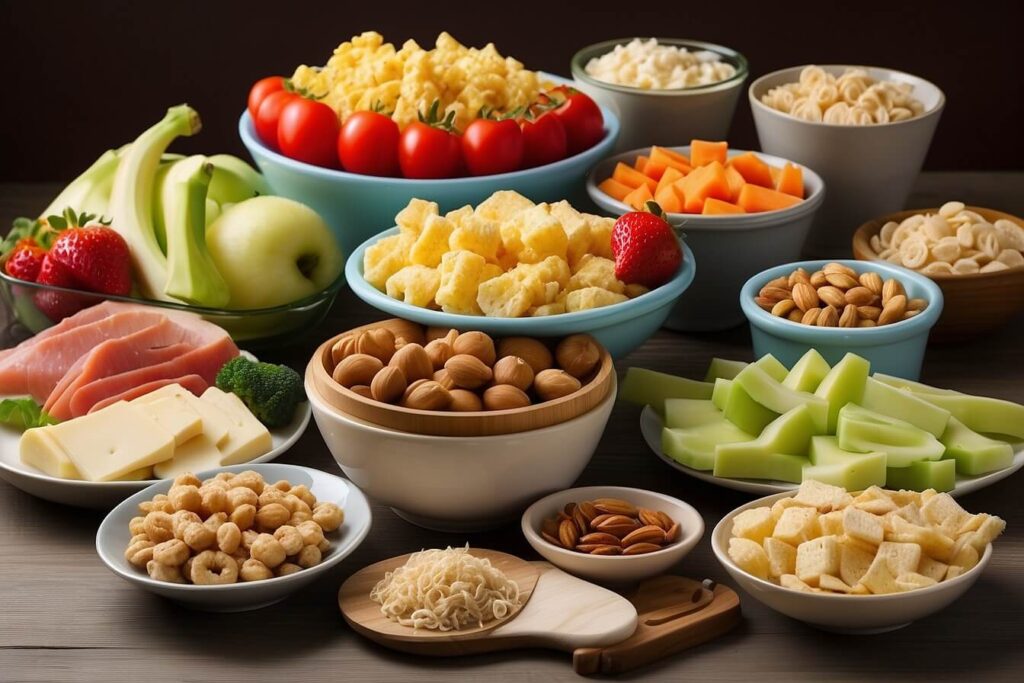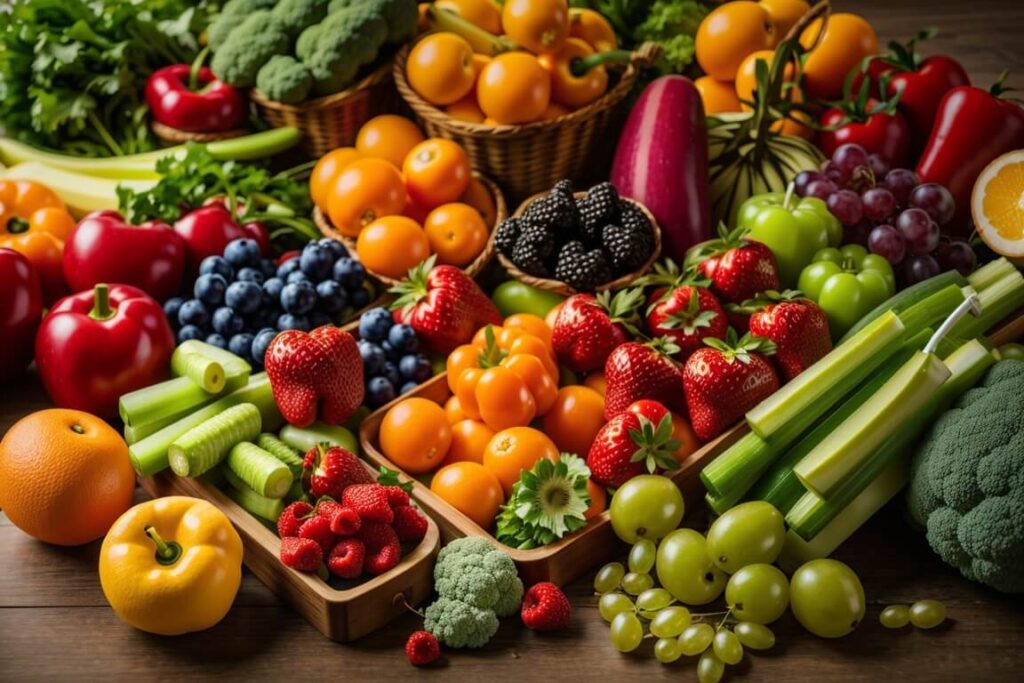Do you often feel tired, sluggish, or unmotivated? Do you struggle to get through the day without relying on caffeine, sugar, or other stimulants? If so, you might be suffering from fatigue, a common condition that affects millions of people worldwide.
Fatigue is not just a feeling of sleepiness or exhaustion. It is a state of reduced physical and mental performance that can impair your quality of life, productivity, and health. Fatigue can have many causes, such as stress, lack of sleep, illness, medication, or underlying medical conditions. However, one of the most important factors that can influence your energy levels is your diet.
What you eat and drink can have a significant impact on how you feel throughout the day. Eating a balanced diet that provides you with all the essential nutrients your body needs can help you fight fatigue and boost your vitality. On the other hand, eating poorly or skipping meals can make you feel more tired and drained.
In this article, we will share with you seven tips for balanced eating to fight fatigue. These tips are based on scientific evidence and practical experience, and they can help you improve your energy levels naturally and safely. By following these tips, you will be able to enjoy a more balanced and fulfilling life.
Tip 1: Eat regular meals and snacks

One of the most common mistakes that people make when trying to fight fatigue is skipping meals or eating irregularly. This can cause your blood sugar levels to fluctuate, which can affect your mood, concentration, and energy levels. When your blood sugar drops too low, you may feel hungry, irritable, shaky, or dizzy. When your blood sugar spikes too high, you may feel jittery, anxious, or sleepy.
To avoid these unpleasant effects, it is important to eat regular meals and snacks throughout the day. This will help you maintain a steady supply of glucose (the main fuel for your brain and muscles) and prevent hunger and cravings. Ideally, you should eat every three to four hours, depending on your activity level and individual needs.
Some examples of healthy meals and snacks are:
- Breakfast: oatmeal with fresh fruits and nuts, scrambled eggs with whole-wheat toast and avocado, yogurt with granola and berries
- Lunch: chicken salad with whole-grain bread and lettuce, vegetable soup with beans and cheese, tuna sandwich with whole-wheat bread and tomato
- Dinner: grilled salmon with brown rice and broccoli, lentil curry with quinoa and spinach, turkey meatballs with whole-wheat pasta and tomato sauce
- Snacks: apple with peanut butter, carrot sticks with hummus, cheese with crackers
Tip 2: Choose complex carbohydrates over simple sugars

Carbohydrates are the main source of energy for your body. However, not all carbohydrates are created equal. There are two types of carbohydrates: simple and complex. Simple carbohydrates are sugars that are quickly digested and absorbed into your bloodstream. They provide a quick burst of energy but also cause a rapid drop in blood sugar levels afterward. Complex carbohydrates are starches and fibers that are slowly digested and absorbed into your bloodstream. They provide a steady and sustained source of energy without causing spikes or crashes in blood sugar levels.
Simple carbohydrates are found in foods such as candy, cookies, cakes, soda, juice, white bread, white rice, white pasta, and processed cereals. These foods are often high in calories but low in nutrients. They can also trigger inflammation in your body, which can contribute to fatigue. Complex carbohydrates are found in foods such as whole grains (oats, barley, buckwheat), legumes (beans, lentils), fruits (apples, bananas), vegetables (carrots, potatoes), nuts (almonds, walnuts), seeds (flaxseeds, chia seeds). These foods are rich in vitamins, minerals, antioxidants, and fiber, which can help fight inflammation, support your immune system, and improve your digestive health.
To fight fatigue effectively, you should choose complex carbohydrates over simple sugars as much as possible. This will help you keep your blood sugar levels stable, avoid energy crashes, and nourish your body with essential nutrients. You should also limit your intake of added sugars, which are sugars that are added to foods during processing or preparation. The World Health Organization recommends that adults consume no more than 25 grams (6 teaspoons) of added sugars per day.
Some examples of how to choose complex carbohydrates over simple sugars are:
- Instead of drinking soda or juice, drink water, tea, or coffee (without sugar).
- Instead of eating white bread or white rice, eat whole-wheat bread or brown rice.
- Instead of eating candy or cookies, eat fresh fruits or dark chocolate.
- Instead of eating processed cereals, eat oatmeal or granola.
Tip 3: Include protein and healthy fats in every meal and snack

Protein and healthy fats are two other important macronutrients that can help you fight fatigue. Protein is the building block of your muscles, organs, hormones, enzymes, and antibodies. It helps you repair and maintain your body tissues, support your immune system, and regulate your metabolism. Protein also helps you feel full and satisfied, which can prevent overeating and weight gain. Healthy fats are essential for your brain, nervous system, heart, skin, and hair. They help you absorb fat-soluble vitamins (A, D, E, and K), produce hormones, and reduce inflammation. Healthy fats also help you feel full and satisfied, which can prevent overeating and weight gain.
Protein and healthy fats can also help you balance your blood sugar levels by slowing down the digestion and absorption of carbohydrates. This can prevent spikes and crashes in blood sugar levels that can cause fatigue. By including protein and healthy fats in every meal and snack, you can ensure that you get enough of these vital nutrients and keep your energy levels steady throughout the day.
Some examples of good sources of protein are:
- Animal products: lean meat (chicken, turkey, beef), fish (salmon, tuna, sardines), eggs, dairy (milk, yogurt, cheese)
- Plant products: legumes (beans, lentils, peas), soy (tofu, tempeh, edamame), nuts (almonds, walnuts, cashews), seeds (flaxseeds, chia seeds, pumpkin seeds), quinoa
Some examples of good sources of healthy fats are:
- Monounsaturated fats: olive oil, avocado, nuts, seeds
- Polyunsaturated fats: fish oil, flaxseed oil, walnut oil
- Omega-3 fatty acids: fish (salmon, tuna, sardines), flaxseeds, chia seeds, walnuts
Some examples of how to include protein and healthy fats in every meal and snack are:
- For breakfast, have eggs with whole-wheat toast and avocado, or yogurt with granola and nuts.
- For lunch, have chicken salad with whole-grain bread and lettuce, or vegetable soup with beans and cheese.
- For dinner, have grilled salmon with brown rice and broccoli, or lentil curry with quinoa and spinach.
- For snacks, have apple with peanut butter, or carrot sticks with hummus.
Tip 4: Eat more fruits and vegetables

Fruits and vegetables are among the most nutritious foods you can eat. They are packed with vitamins, minerals, antioxidants, phytochemicals, and fiber that can benefit your health in many ways. Fruits and vegetables can help you fight fatigue by providing you with natural sugars that can boost your energy levels without causing blood sugar imbalances. They can also help you fight inflammation by neutralizing free radicals that can damage your cells. They can also help you support your immune system by enhancing your body’s defense against infections. They can also help you improve your digestive health by feeding the beneficial bacteria in your gut.
The World Health Organization recommends that adults eat at least 400 grams (5 portions) of fruits and vegetables per day. However, many people do not meet this recommendation due to various reasons such as lack of availability, affordability, preference, or knowledge. To increase your intake of fruits and vegetables, you can try the following tips:
- Eat a variety of fruits and vegetables of different colors. Each color represents a different group of phytochemicals that have different health benefits. For example, red fruits and vegetables (such as tomatoes, strawberries, cherries) contain lycopene, which can protect against prostate cancer. Green fruits and vegetables (such as spinach, kale, kiwi) contain chlorophyll, which can detoxify your liver. Purple fruits and vegetables (such as blueberries, eggplant, grapes) contain anthocyanins, which can improve your memory.
- Eat fruits and vegetables in their whole form as much as possible. Whole fruits and vegetables contain more fiber than juices or purees. Fiber can help you feel full longer, lower your cholesterol levels, and prevent constipation.
- Eat fruits and vegetables as snacks instead of processed foods. Fruits and vegetables are low in calories but high in nutrients. They can satisfy your hunger and cravings without adding extra calories to your diet. Processed foods are often high in calories but low in nutrients. They can make you feel hungry and crave more food soon after eating them.
- Add fruits and vegetables to your dishes whenever possible. You can add fruits and vegetables to your salads soups stews curries sandwiches pizzas pastas or desserts. You can also blend fruits and vegetables into
smoothies, sauces, dips, or dressings. You can also bake fruits and vegetables into muffins, cakes, pies, or breads.
Some examples of how to eat more fruits and vegetables are:
- For breakfast, have a smoothie made with banana, spinach, almond milk, and flaxseeds, or a muffin made with apple, carrot, oatmeal, and walnuts.
- For lunch, have a salad made with lettuce, tomato, cucumber, avocado, and chicken, or a soup made with pumpkin, onion, garlic, and coconut milk.
- For dinner, have a stew made with beef, potato, carrot, celery, and peas, or a curry made with chickpeas, cauliflower, tomato, and coconut milk.For snacks, have a handful of grapes or cherries, or a slice of watermelon or pineapple.
Tip 5: Stay hydrated

7 Tips for Balanced Eating to Fight Fatigue Water is essential for your life. It makes up about 60% of your body weight and performs many vital functions. Water helps you regulate your body temperature, transport nutrients and oxygen to your cells, flush out toxins and waste from your organs, lubricate your joints and eyes, and cushion your brain and spinal cord. Water also helps you fight fatigue by preventing dehydration. Dehydration is a condition where your body loses more water than it takes in. Dehydration can cause symptoms such as headache, dizziness, dry mouth, fatigue, and weakness. Dehydration can also impair your cognitive and physical performance by reducing your attention span, memory, reaction time, coordination, and endurance.
To prevent dehydration and fight fatigue, you should drink enough water throughout the day. The amount of water you need depends on various factors such as your age, weight, activity level, climate, and health status. However, a general guideline is to drink at least 2 liters (8 glasses) of water per day. You may need more water if you exercise intensely, sweat a lot, live in a hot or dry environment, or have a fever, diarrhea, or vomiting.
Some tips to help you stay hydrated are:
- Drink water before, during, and after exercise.
- Drink water before you feel thirsty. Thirst is a sign that you are already dehydrated.
- Drink water with every meal and snack.
- Drink water instead of sugary drinks such as soda, juice, or sports drinks. These drinks can add extra calories to your diet and cause blood sugar imbalances.
- Drink water flavored smoothies, sauces, or dips. You can also bake fruits and vegetables into muffins, cakes, or pies.
Some examples of how to eat more fruits and vegetables are:
- For breakfast, have a smoothie made with banana, spinach, almond milk, and flaxseeds, or a muffin made with apple, carrot, oatmeal, and walnuts.
- For lunch, have a salad made with lettuce, tomato, cucumber, avocado, and chicken, or a soup made with pumpkin, onion, garlic, and coconut milk.
- For dinner, have a stew made with beef, potato, carrot, celery, and peas, or a curry made with chickpeas, cauliflower, tomato, and coconut milk.
- For snacks, have a handful of grapes, or a dip made with yogurt, cucumber, and mint.
Tip 6: Limit your intake of caffeine and alcohol

7 Tips for Balanced Eating to Fight Fatigue Caffeine and alcohol are two substances that many people consume to cope with fatigue. Caffeine is a stimulant that can temporarily increase your alertness, energy, and mood. Alcohol is a depressant that can temporarily relax you, reduce stress, and improve sleep quality. However, both caffeine and alcohol can also have negative effects on your energy levels in the long term. Caffeine can interfere with your sleep quality by delaying the onset of sleep, reducing the duration of sleep, and disrupting the stages of sleep. Caffeine can also cause withdrawal symptoms such as headache, irritability, anxiety, or fatigue when you stop consuming it or reduce the amount you consume. Alcohol can interfere with your sleep quality by disrupting the stages of sleep, causing frequent awakenings, and reducing the amount of deep sleep. Alcohol can also cause dehydration, hangover symptoms such as headache, nausea, fatigue, or low blood sugar when you consume too much or too often.
To avoid these negative effects on your energy levels, you should limit your intake of caffeine and alcohol as much as possible. The amount of caffeine and alcohol that you can tolerate depends on various factors such as your age, weight, genetics, tolerance level, and health status. However, a general guideline is to consume no more than 400 milligrams (4 cups) of caffeine per day and no more than 14 units (7 drinks) of alcohol per week for men and 7 units (3 drinks) of alcohol per week for women. You should also avoid consuming caffeine or alcohol close to bedtime as they can disrupt your sleep quality.
Some tips to help you limit your intake of caffeine and alcohol are:
- Choose decaffeinated or herbal teas or coffees instead of regular ones.
- Choose water or sparkling water instead of soda or energy drinks.
- Choose low-alcohol or alcohol-free beers or wines instead of regular ones.
- Choose smaller servings or dilute your drinks with water or ice.
- Drink slowly and savor your drinks.
- Alternate between alcoholic and non-alcoholic drinks.
- Set a limit for yourself and stick to it.
Tip 7: Take supplements if needed
Sometimes, eating a balanced diet may not be enough to provide you with all the nutrients you need to fight fatigue. You may have a deficiency or an increased need for certain nutrients due to various reasons such as genetic factors, medical conditions, medication, lifestyle, or environmental factors. In such cases, taking supplements may help you correct the deficiency or meet the increased need and improve your energy levels.
Some of the most common nutrients that can help you fight fatigue are:
- Iron: Iron is a mineral that helps your red blood cells carry oxygen to your cells. Iron deficiency can cause anemia, a condition where you have a low number of red blood cells or a low amount of hemoglobin (the protein that carries oxygen) in your blood. Anemia can cause symptoms such as fatigue, weakness, pale skin, shortness of breath, and dizziness. Iron deficiency can be caused by blood loss, poor absorption, low intake, or increased demand. Iron supplements can help you treat iron deficiency anemia and improve your energy levels. However, you should consult your doctor before taking iron supplements as they can have side effects such as constipation, nausea, vomiting, or diarrhea. You should also avoid taking iron supplements with foods or drinks that can reduce iron absorption such as tea, coffee, calcium, or zinc.
- Vitamin B12: Vitamin B12 is a vitamin that helps your body make red blood cells, DNA, and nerve cells. Vitamin B12 deficiency can cause pernicious anemia, a condition where you have a low number of red blood cells or a low amount of hemoglobin in your blood due to a lack of intrinsic factor (a protein that helps your body absorb vitamin B12). Pernicious anemia can cause symptoms such as fatigue, weakness, pale skin, numbness, tingling, or memory loss. Vitamin B12 deficiency can be caused by poor absorption, low intake, or increased demand. Vitamin B12 supplements can help you treat pernicious anemia and improve your energy levels. However, you should consult your doctor before taking vitamin B12 supplements as they can interact with certain medications such as metformin, colchicine, or antibiotics.
- Magnesium: Magnesium is a mineral that helps your body produce energy, regulate muscle and nerve function, and maintain bone health. Magnesium deficiency can cause symptoms such as fatigue, weakness, muscle cramps, twitches, or spasms. Magnesium deficiency can be caused by poor absorption, low intake, or increased demand. Magnesium supplements can help you treat magnesium deficiency and improve your energy levels. However, you should consult your doctor before taking magnesium supplements as they can have side effects such as diarrhea, nausea, vomiting, or low blood pressure. You should also avoid taking magnesium supplements with foods or drinks that can reduce magnesium absorption such as tea, coffee, calcium, or zinc.
These are some of the most common supplements that can help you fight fatigue. However, there are many other supplements that may also help you depending on your individual needs and preferences. For example, some people may benefit from taking supplements such as coenzyme Q10, creatine, ginseng, or ashwagandha. However, you should always consult your doctor before taking any supplements as they may not be suitable for everyone and they may have side effects or interactions with other medications or supplements.
Conclusion
Fatigue is a common condition that affects millions of people worldwide. It can impair your quality of life, productivity, and health. However, you can fight fatigue naturally and safely by eating a balanced diet that provides you with all the essential nutrients your body needs to function optimally. By following the seven tips we shared with you in this article, you will be able to improve your energy levels and enjoy a more balanced and fulfilling life.
We hope you found this article helpful and informative. If you have any questions or comments about balanced eating to fight fatigue, please feel free to leave them below. We would love to hear from you and learn from your experience.
Also learn 30 easy everyday recipes for breakfast, lunch and dinner to eat healthily, lose weight and get in shape click and learn now


